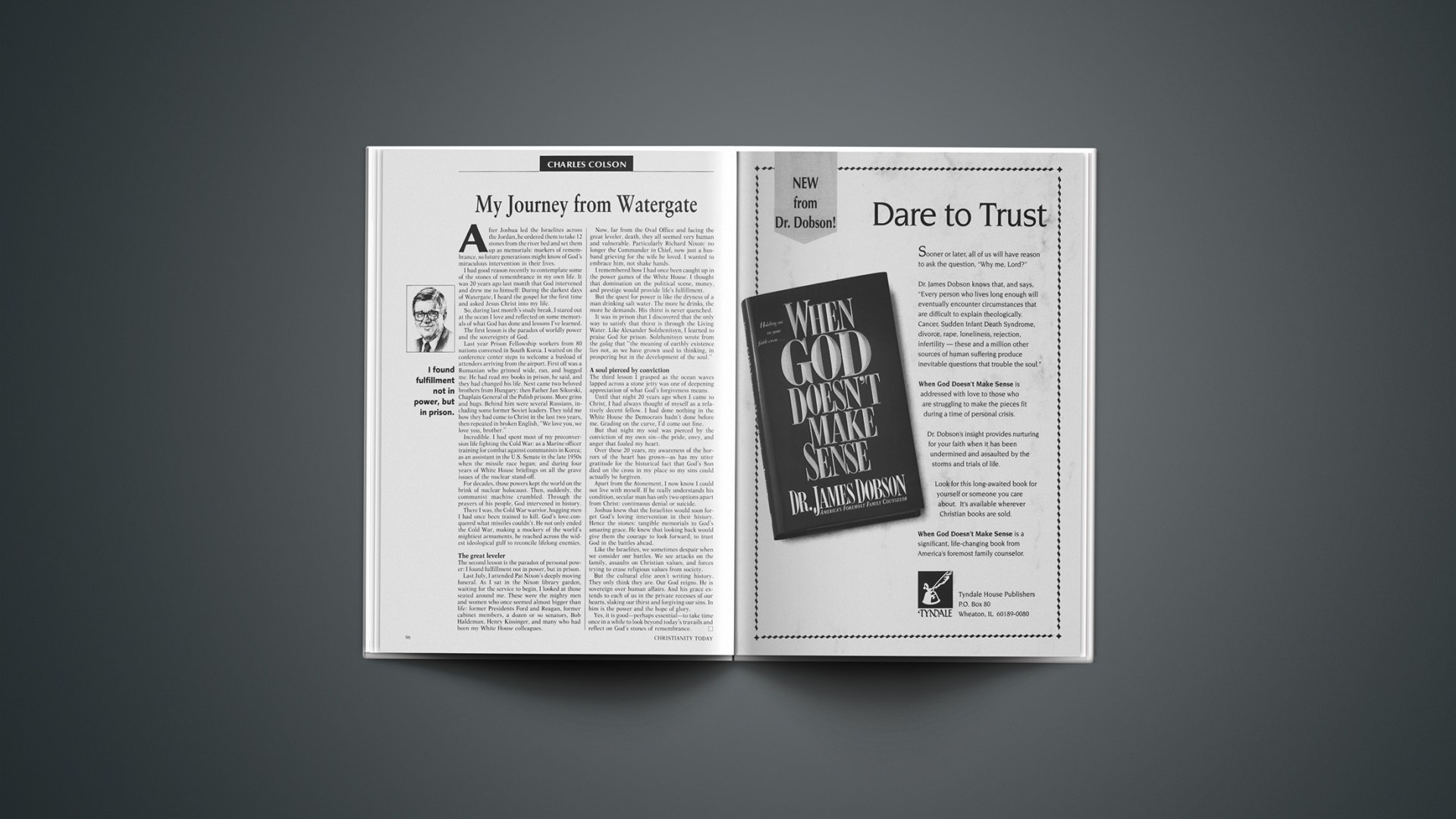After Joshua led the Israelites across the Jordan, he ordered them to take 12 stones from the river bed and set them up as memorials: markers of remembrance, so future generations might know of God’s miraculous intervention in their lives.
I had good reason recently to contemplate some of the stones of remembrance in my own life. It was 20 years ago last month that God intervened and drew me to himself: During the darkest days of Watergate, I heard the gospel for the first time and asked Jesus Christ into my life.
So, during last month’s study break, I stared out at the ocean I love and reflected on some memorials of what God has done and lessons I’ve learned.
The first lesson is the paradox of worldly power and the sovereignty of God.
Last year Prison Fellowship workers from 80 nations convened in South Korea. I waited on the conference center steps to welcome a busload of attenders arriving from the airport. First off was a Romanian who grinned wide, ran, and hugged me. He had read my books in prison, he said, and they had changed his life. Next came two beloved brothers from Hungary; then Father Jan Sikorski, Chaplain General of the Polish prisons. More grins and hugs. Behind him were several Russians, including some former Soviet leaders. They told me how they had come to Christ in the last two years, then repeated in broken English, “We love you, we love you, brother.”
Incredible. I had spent most of my preconversion life fighting the Cold War: as a Marine officer training for combat against communists in Korea; as an assistant in the U.S. Senate in the late 1950s when the missile race began; and during four years of White House briefings on all the grave issues of the nuclear stand-off.
For decades, those powers kept the world on the brink of nuclear holocaust. Then, suddenly, the communist machine crumbled. Through the prayers of his people, God intervened in history.
There I was, the Cold War warrior, hugging men I had once been trained to kill. God’s love conquered what missiles couldn’t. He not only ended the Cold War, making a mockery of the world’s mightiest armaments, he reached across the widest ideological gulf to reconcile lifelong enemies.
The great leveler
The second lesson is the paradox of personal power: I found fulfillment not in power, but in prison.
Last July, I attended Pat Nixon’s deeply moving funeral. As I sat in the Nixon library garden, waiting for the service to begin, I looked at those seated around me. These were the mighty men and women who once seemed almost bigger than life: former Presidents Ford and Reagan, former cabinet members, a dozen or so senators, Bob Haldeman, Henry Kissinger, and many who had been my White House colleagues.
Now, far from the Oval Office and facing the great leveler, death, they all seemed very human and vulnerable. Particularly Richard Nixon: no longer the Commander in Chief, now just a husband grieving for the wife he loved. I wanted to embrace him, not shake hands.
I remembered how I had once been caught up in the power games of the White House. I thought that domination on the political scene, money, and prestige would provide life’s fulfillment.
But the quest for power is like the dryness of a man drinking salt water. The more he drinks, the more he demands. His thirst is never quenched.
It was in prison that I discovered that the only way to satisfy that thirst is through the Living Water. Like Alexander Solzhenitsyn, I learned to praise God for prison. Solzhenitsyn wrote from the gulag that “the meaning of earthly existence lies not, as we have grown used to thinking, in prospering but in the development of the soul.”
A soul pierced by conviction
The third lesson I grasped as the ocean waves lapped across a stone jetty was one of deepening appreciation of what God’s forgiveness means.
Until that night 20 years ago when I came to Christ, I had always thought of myself as a relatively decent fellow. I had done nothing in the White House the Democrats hadn’t done before me. Grading on the curve, I’d come out fine.
But that night my soul was pierced by the conviction of my own sin—the pride, envy, and anger that fouled my heart.
Over these 20 years, my awareness of the horrors of the heart has grown—as has my utter gratitude for the historical fact that God’s Son died on the cross in my place so my sins could actually be forgiven.
Apart from the Atonement, I now know I could not live with myself. If he really understands his condition, secular man has only two options apart from Christ: continuous denial or suicide.
Joshua knew that the Israelites would soon forget God’s loving intervention in their history. Hence the stones: tangible memorials to God’s amazing grace. He knew that looking back would give them the courage to look forward, to trust God in the battles ahead.
Like the Israelites, we sometimes despair when we consider our battles. We see attacks on the family, assaults on Christian values, and forces trying to erase religious values from society.
But the cultural elite aren’t writing history. They only think they are. Our God reigns. He is sovereign over human affairs. And his grace extends to each of us in the private recesses of our hearts, slaking our thirst and forgiving our sins. In him is the power and the hope of glory.
Yes, it is good—perhaps essential—to take time once in a while to look beyond today’s travails and reflect on God’s stones of remembrance.
Loren Wilkinson is the writer/editor of Earthkeeping in the ’90s (Eerdmans) and the coauthor, with his wife, Mary Ruth Wilkinson, of Caring for Creation in Your Own Backyard (Servant). He teaches at Regent College in Vancouver, British Columbia, Canada.










